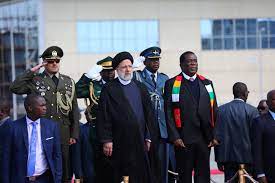While US Sleeps, Iran Is Making Inroads In Africa
BY MEIR BEN SHABBAT
Iran is trying to build on the diplomatic momentum it has enjoyed in recent months by bolstering its standing in the African continent and adding more countries to the anti-US camp.
After restoring relations with Saudi Arabia and the United Arab Emirates, and even as it deepens it strategic collaboration with Russia, Iran is now setting its sights on another diplomatic goal: Africa.
Iranian President Ibrahim Raisi launched his tour of Africa several days ago, in what is the first such visit by an Iranian leader in more than a decade. He is expected to meet with leaders from Kenya, Uganda, and Zimbabwe. His stated goal is to bring about more cooperation on economic issues between the Islamic Republic and Africa, which he considers to be the "continent of opportunity."
But apart from economic issues, it is clear that he will try to use the visit to build on the diplomatic momentum Iran has enjoyed in recent months by bolstering its standing in the African continent and adding more countries to the anti-US camp. Iran has been key to forming that bloc.
Only a week ago, the Iranian foreign minister met his Sudanian counterpart after a 7-year hiatus in such high-level talks. The two sides, according to Iranian media, talked about ways to restore ties.
As we may recall, Sudan used to be a partner in the Iranian effort to ship arms to Hamas in the Gaza Strip, triggering – according to foreign media – Israeli strikes on the African country. In 2020, Sudan joined the Abraham Accords but the signing of the bilateral agreements has stalled for various reasons. Meanwhile, a civil war recently broke out there, adding to the uncertainty on the fate of the normalization with Israel.
Another major milestone in the Iranian foray into the African continent took place some two weeks ago and involves Sudan's neighbor – Egypt.
According to various reports, Iran and Egypt agreed to restore direct flights, which were suspended over 40 years ago. This step, if true, reflects not just the economic necessity of both countries but also a desire to start a new chapter in their relationship, which has been plagued by much hostility and strain over the years. We can't tell where things will go from here, but for now, it has been confirmed that Egypt will lift restrictions on tourist visas from Iran.
Iran has also enjoyed warm ties with other important countries in the continent, including South Africa and Algeria, which is also one of the few in the Arab world that have been collaborating with Tehran. There have also been recent tensions between Algiers and Rabat in the wake of the Abraham Accords and the efforts on the part of the latter to have its sovereignty over Western Sahara recognized.
"The dynamic diplomacy has been launched in order to continue realizing Iran's national interests," Iran's foreign minister said in describing the country's energetic burst on the world stage. The de facto goal in doing this is to neuralizing the effect the sanctions have on Iran and to open up new opportunities to improve its economy.
But these efforts are designed to serve an over-arching goal: influencing the new world order, and creating a multilateral system that will serve as a counterweight (i.e. weaken) the US and the West.
It appears as though the Biden administration is not fully monitoring all this. It is too consumed with domestic matters, the rivalry with China, and the Ukraine war. Its policies in the Middle East have allowed Iran to gain strength and had Washington's Arab friends embrace Russia and China.
We should not expect that Iran's activity in Africa will have Biden wake up from its slumber and act. What can Israel do?
First, Israel should shore up its presence in African states, especially in countries that have been in Iran's sights. Second, it should finalize the normalization deals with Sudan, despite its domestic turbulence. Third, it must make sure to engage Egypt at the proper levels to avoid friction over its new ties with Iran. Fourth, it must recognize Morocco's sovereignty over the Western Sahara.
All this will help bolster ties with Morocco and weaken the efforts by Islamic elements (led by Iran and Algeria) to tarnish Rabat. And above all, Israel must subscribe to an activist foreign policy under the premise that if Israel doesn't show up, someone else will – and will not be a force for good.
READ ORIGINAL STORY HERE



Comments